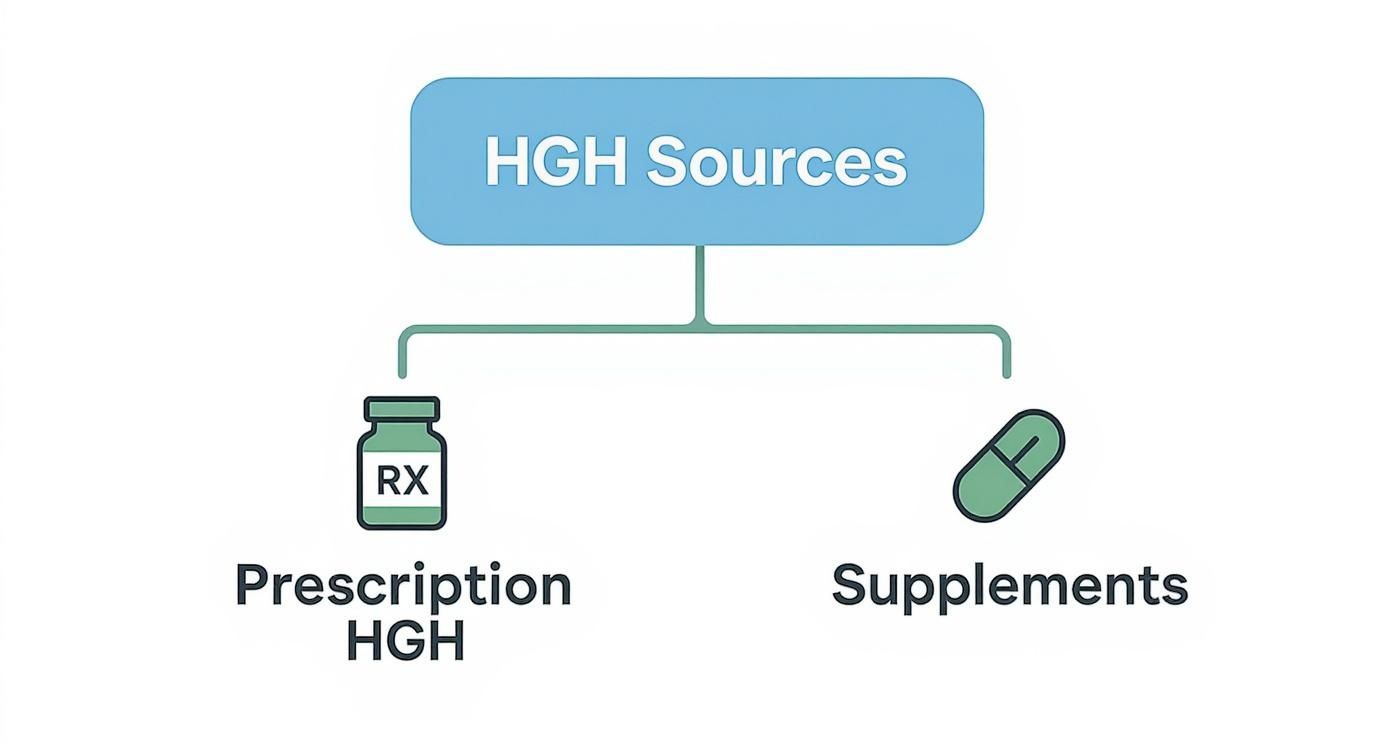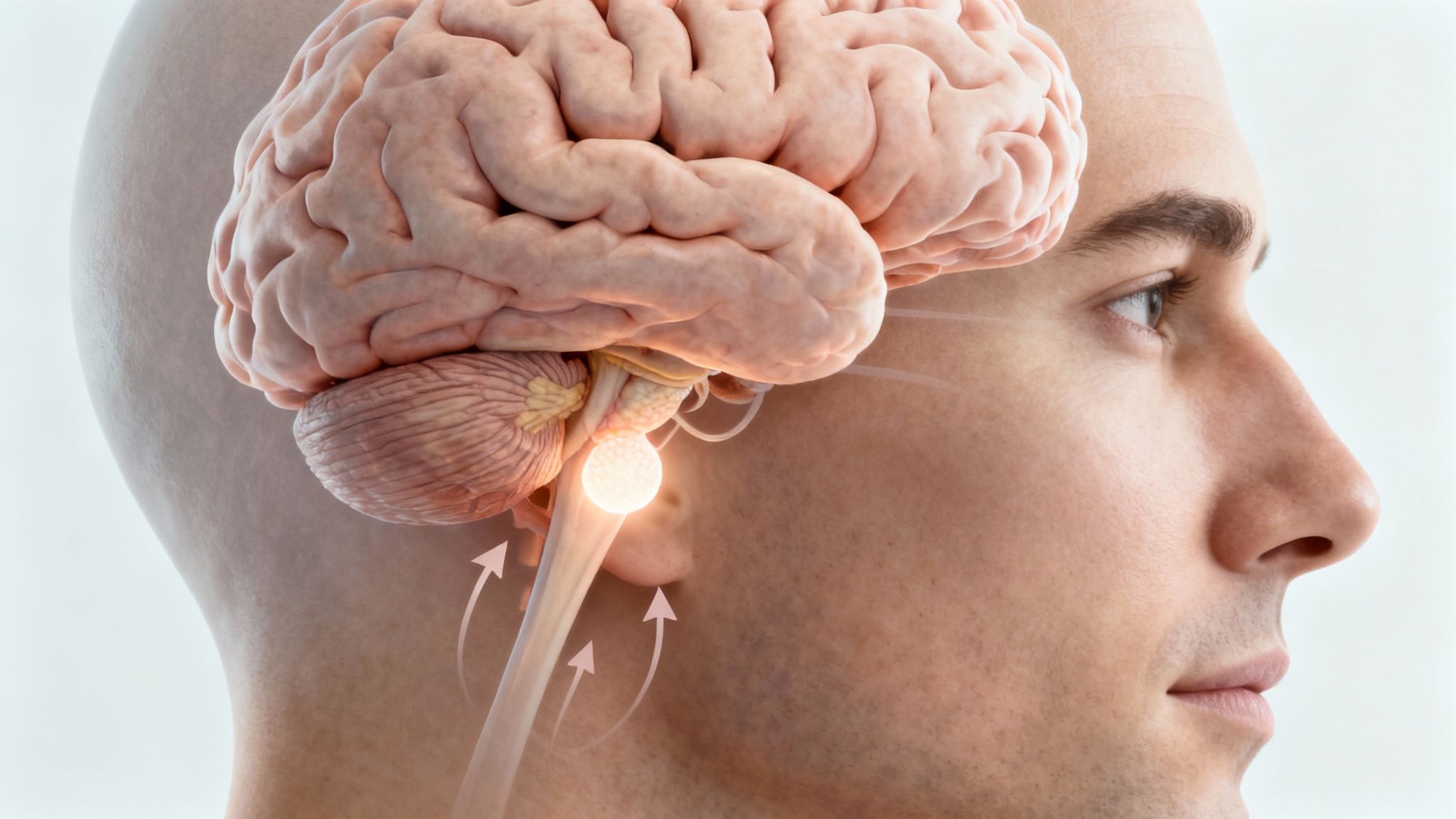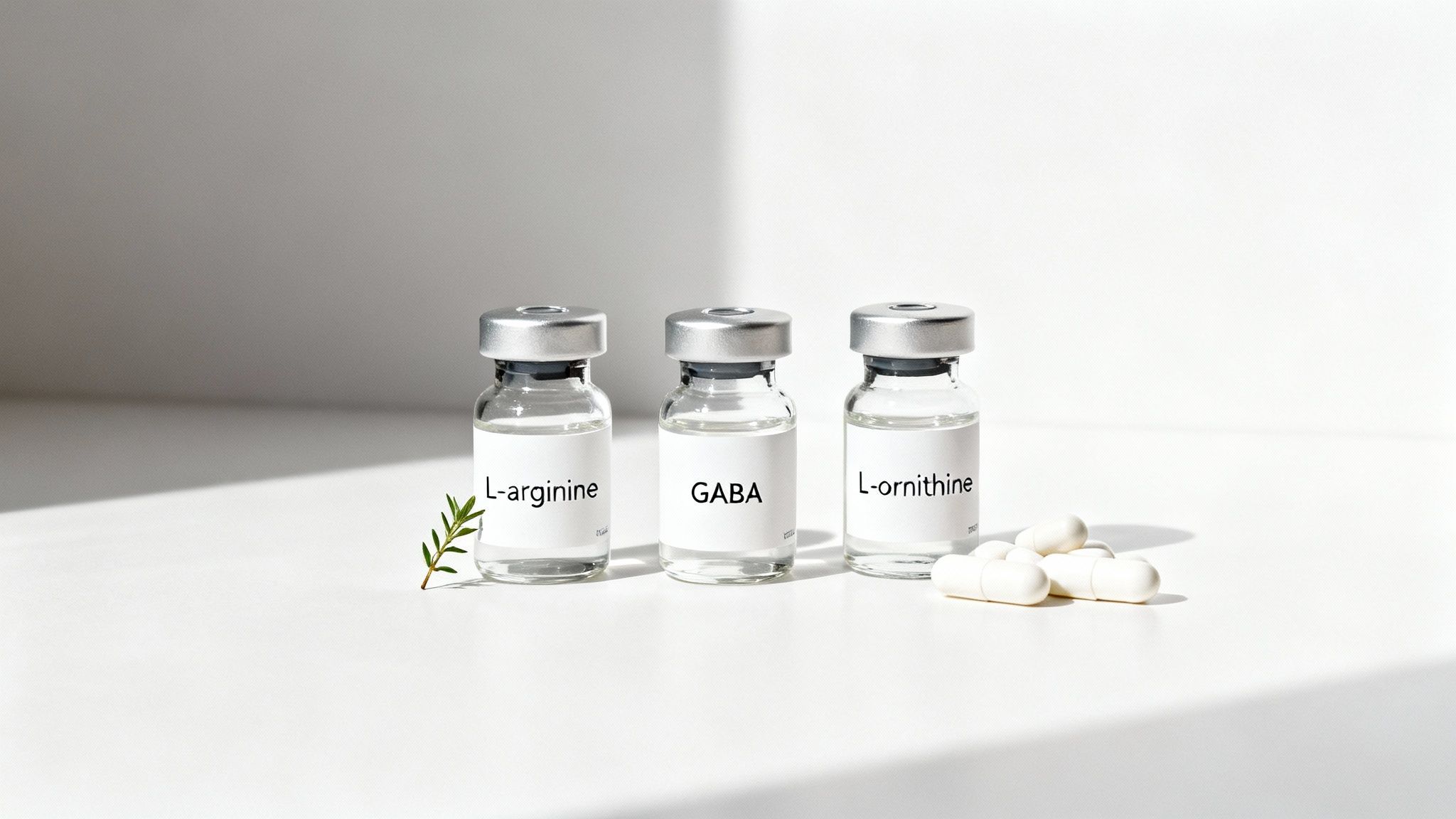Tu carrito está vacío
TIEMPO LIMITADO: Envío GRATIS en todos los pedidos en los 48 estados contiguos
Let's get one thing straight right out of the gate: an HGH supplement is NOT the same thing as prescription HGH. This is the single most important distinction to make, and it's where most of the confusion starts.
They are fundamentally different products, operating in entirely different worlds.
When you see a bottle labeled "HGH supplement," it's natural to think it contains actual human growth hormone. But it doesn't. Not even a little bit.
What you're looking at are products more accurately called HGH boosters or secretagogues. Their entire job is to supply your body with the raw materials—mostly amino acids and herbal extracts—that might encourage your pituitary gland to produce more of its own growth hormone.
Here’s a simple way to think about it:
One path involves a doctor, a diagnosis, and a powerful synthetic hormone. The other involves a trip to the supplement aisle for nutritional support.
Prescription HGH is a bioidentical hormone called somatropin. It's administered by injection and is only legally available to treat specific medical conditions, like diagnosed growth hormone deficiency (GHD).
HGH supplements, on the other hand, fall under the same loose regulations as any other dietary supplement. This means they are not pre-approved by the FDA for safety or effectiveness before hitting the shelves.
This supplement market is a slice of the much larger global human growth hormone industry, which was valued at a staggering USD 6.32 billion in 2023. Projections show it climbing to USD 14.28 billion by 2030, an increase driven almost entirely by legitimate medical uses, not over-the-counter pills. You can dig deeper into these market trends and their drivers to see the full picture.
The infographic below really helps visualize these two separate worlds.

As you can see, one is a medically regulated and controlled substance, while the other is an unregulated, nutritional approach available to anyone.
To make this crystal clear, let’s put them side-by-side. The table below cuts through the marketing noise and lays out the fundamental differences between the real deal and the products trying to emulate it.
| Attribute | Prescription HGH (Somatropin) | HGH Supplement (Booster) |
|---|---|---|
| Active Ingredient | Bioidentical Human Growth Hormone | Amino acids, vitamins, herbal extracts |
| Mechanism | Directly adds synthetic HGH to the body | Aims to stimulate the body's own HGH production |
| Legal Status | Prescription-only, controlled substance | Over-the-counter dietary supplement |
| Administration | Injection | Oral (pills, powders, sprays) |
| Regulation | Heavily regulated by the FDA for safety and efficacy | Regulated as food; not pre-approved by the FDA |
| Proven Efficacy | Clinically proven for diagnosed GHD and other conditions | Lacks robust clinical evidence for significant HGH increase |
| Cost | Very expensive ($1,000+ per month) | Relatively inexpensive ($40 - $100 per month) |
Understanding these distinctions is your best defense against misleading claims. Knowing that these two products operate in completely separate categories—from their ingredients to their legal status—is the first step toward making an informed, safe decision for your health.

Before we even touch on supplements, we have to talk about your body’s own hormone production line. It all starts with a tiny, pea-sized gland at the base of your brain: the pituitary gland. This little powerhouse is the command center for producing Human Growth Hormone (HGH).
Think of the pituitary as a factory manager. It doesn't just crank out HGH all day; it waits for specific orders from its boss, the hypothalamus. This back-and-forth ensures HGH gets released precisely when your body needs it.
And it’s not a steady drip. HGH is released in short bursts, or pulses. The biggest and most important pulse happens right after you fall into deep sleep, which is why getting quality sleep is absolutely fundamental for healthy hormone levels.
Your body’s relationship with HGH is a tale of two acts: growth and maintenance.
During childhood and your teenage years, the pituitary is firing on all cylinders. HGH production is at an all-time high, driving the growth of bones, muscles, and organs. It’s the single hormone most responsible for those classic growth spurts that build your adult frame.
But once you hit adulthood, HGH gets a new job description. It pivots from being the construction foreman to the head of the maintenance crew. Its new role is to help maintain muscle mass, regulate your metabolism, repair cells, and keep your body composition in check.
Key Takeaway: HGH isn't just for growing taller. In adults, it's a vital "repair and maintenance" hormone that's crucial for recovery, metabolism, and keeping you feeling your best.
This role change also means that after peaking around age 20, your natural HGH levels start a slow, but steady, decline. This is a totally normal part of aging, a process sometimes called somatopause.
So what actually tells the pituitary to get to work? The hypothalamus sends two key signals that create a delicate balance. Understanding this system is key to seeing how lifestyle—or a supplement—could potentially influence it.
This constant push-and-pull is swayed by your daily habits. Things like intense exercise, deep sleep, and low blood sugar all trigger GHRH, signaling a need for repair and energy. This is exactly the mechanism that lifestyle changes and natural HGH boosters aim to support.
On the flip side, high blood sugar and stress can pump up somatostatin, hitting the brakes on HGH production.
This whole intricate dance is the foundation for every HGH-related product on the market. The idea behind most HGH supplements isn't to inject a foreign hormone, but to gently nudge this natural system—usually by providing the amino acid building blocks or trying to influence that "green light" GHRH signal. Getting a handle on this natural rhythm is the first step to figuring out if any supplement can actually make a difference.

This is where the marketing claims meet the science. Any HGH supplement is only as good as what’s inside the capsule, and understanding those compounds is the only way to make a smart call.
The whole theory behind these products revolves around a core group of amino acids. The idea is simple: give your body the right building blocks, and you can coax the pituitary gland into producing more HGH on its own.
But does that theory actually hold water when you swallow a pill instead of getting an IV drip in a controlled lab study? Let’s pull back the curtain on the most common ingredients you'll see on the label.
L-arginine is almost always the headliner in any HGH formula. As an amino acid, it’s a key player in blood flow and building protein, and sure enough, clinical studies have shown it can trigger a release of HGH.
Here's the catch: the context of those studies is everything. Researchers were often giving people very large doses of L-arginine intravenously, shooting it straight into the bloodstream. This method completely bypasses digestion and delivers a potent, immediate jolt to the pituitary gland.
When you take L-arginine orally in a supplement, it's a completely different story. Your digestive system gets to work, breaking it down and metabolizing most of it long before it has a chance to influence your hormones. Most studies looking at oral L-arginine for HGH release show little to no significant effect, especially for healthy people at rest.
The Reality Check: While an IV of arginine can spike HGH in a lab, the oral doses found in a typical supplement are just not likely to produce a meaningful increase in your growth hormone levels. If there is an effect, it's usually tiny and temporary.
Gamma-aminobutyric acid, better known as GABA, is another common ingredient. This is your brain's main "off switch"—an inhibitory neurotransmitter that helps calm nerve activity, dial down anxiety, and get you ready for sleep.
Its role in an HGH supplement is all about sleep. Your body releases its biggest surge of HGH during the first few hours of deep, restorative sleep. So, anything that improves sleep quality could, in theory, support natural hormone production.
Research does suggest a link between taking GABA and seeing increased HGH levels, both at rest and after a workout. The effect seems a bit more reliable than what you see with other aminos, but we still don't have a clear picture of its long-term impact on your total 24-hour HGH output.
Beyond the main ingredients, you'll usually find a few other amino acids filling out the formula.
L-Ornithine: Often paired up with L-arginine, this amino acid is also involved in the body's metabolic pathways. Some research hints that it might help reduce fatigue during long workouts, but its direct impact on HGH when taken orally is not well-established. It runs into the same absorption issues as arginine.
L-Glutamine: This is the most plentiful amino acid in your muscles, playing a huge part in immune health and gut function. While it’s absolutely vital for recovery, its reputation as an HGH booster hangs on some very thin evidence. One older study did show an increase, but more modern, robust research is needed to say for sure.
These ingredients are critical for your overall health, which is why they pop up when we discuss the best supplements for muscle growth. But their power to act as direct HGH boosters through a simple pill is far from a scientific certainty.
It’s crucial to remember why people are looking for HGH support. For doctors, the goal is treating a diagnosed deficiency, which is quite rare. The prevalence of growth hormone deficiency in kids is only about 1 in every 3,500 to 4,000 in the UK and the U.S., which is what drives the need for legitimate therapies. You can see this reflected in the global HGH market dynamics and what fuels its expansion.
For the average person buying a supplement, the goal isn’t to fix a deficiency. It's to optimize what they already have for better performance, faster recovery, or anti-aging benefits.
So, the real question is this: are the small, inconsistent bumps in HGH that these ingredients might offer enough to actually produce noticeable results in muscle, fat loss, or energy? For most people, the scientific consensus points to no. The impact is just too small to come close to the effects of prescription HGH or even the powerful natural boost you get from intense exercise and a solid night's sleep.
Before you even think about trying an HGH product, you need a clear-eyed look at the rules and risks. This isn't just a suggestion—understanding the safety and legal landscape is non-negotiable.
Let's get the most critical point out of the way first: injectable human growth hormone is a controlled substance. You simply cannot buy or use it legally without a doctor's prescription for a diagnosed medical issue, like adult growth hormone deficiency.
This isn't some minor technicality. Getting caught with it or distributing it without a prescription comes with serious legal penalties. The demand for legitimate, therapeutic HGH has fueled a massive, highly regulated market. In fact, the U.S. is the single biggest market for it, with projections expected to hit around USD 7.08 billion by 2024, all driven by legitimate medical use. You can dig into the data on what's driving the HGH market if you're curious.
So, what about all those HGH "supplements" you see advertised online and on store shelves? They live in a completely different regulatory universe.
These products are classified as dietary supplements, which lumps them in with things like your daily multivitamin or tub of protein powder. This means they are not subject to FDA testing or approval for safety and effectiveness before they are sold.
The Food and Drug Administration (FDA) doesn't verify the claims or ingredients of a dietary supplement before it hits the market. The manufacturer is 100% responsible for ensuring the product is safe and accurately labeled.
This regulatory gray area is a huge gamble for consumers. Without any independent oversight, you’re just trusting that what’s on the label is actually what's in the bottle.
This opens the door to some serious potential risks:
It’s also really important to understand the difference between the side effects of misusing real HGH and the risks of taking an unregulated "HGH supplement." Abusing actual injectable, synthetic HGH can cause a laundry list of serious health problems.
We're not talking about minor annoyances here. These are significant medical complications with long-term consequences.
Known side effects of misusing prescription HGH include:
Now, a typical HGH supplement probably isn't potent enough to trigger these specific hormonal side effects. The risk with supplements is all about the unknown. You're putting your faith entirely in a company's internal quality control, with no government agency double-checking their work.
This is the fundamental trade-off that the flashy marketing almost never mentions. You have to weigh the unproven benefits against these very real legal and safety concerns before making any decisions.

After wading through the hype and confusion of HGH supplements, let's get back to what actually works—and what’s completely within your control. Your body already has an incredibly powerful system for producing growth hormone. The real key isn't finding some magic pill; it's creating the perfect environment for that system to do its job.
Forget chasing unproven formulas. You can get significant, lasting results by focusing on the three pillars of natural hormonal health. These are actionable, science-backed strategies that support your body’s own HGH production safely and sustainably. No purchase necessary.
The pillars are simple but profound: deep sleep, targeted exercise, and smart nutrition. When you master these, you give your body the exact signals it needs to fire up its own potent revitalization system.
If there’s one "magic bullet" for natural HGH production, it's deep sleep. Period. Your pituitary gland doesn't just release a steady trickle of growth hormone throughout the day. It releases it in powerful pulses, and the biggest, most important surge happens during the first few hours of slow-wave sleep.
This isn’t just dozing off or dreaming—it’s that deep, restorative phase where your body does its most important repair work. Skimping on sleep, or even just suffering from poor quality sleep, directly sabotages this critical process.
The Bottom Line: You can have the perfect diet and a killer workout routine, but if your sleep is garbage, your natural HGH production will suffer. Prioritizing sleep is the single most effective move you can make.
To really dial in your sleep quality and max out that nightly HGH pulse, focus on consistency. Aim to go to bed and wake up around the same time every day, make your room cool, dark, and quiet, and ditch the screens for at least an hour before you hit the hay.
While sleep gives you the biggest sustained release, certain types of exercise can trigger powerful, short-term spikes in HGH. The keyword here is intensity. A casual walk is great for your health, but it’s not going to tell your pituitary gland to open the floodgates.
Two kinds of training really stand out for their ability to kickstart HGH production:
This exercise-induced spike is a core part of your body's adaptation process. The intense effort signals a need for recovery and muscle repair, and HGH is one of the primary tools your body uses for the job. Of course, efficient recovery is crucial, and you can learn more about supporting this process with science-backed supplements for muscle recovery.
Your diet is the final piece of the puzzle. While no single food will send your HGH through the roof, your overall nutritional strategy plays a vital supporting role, mainly by keeping your insulin levels in check.
High blood sugar and chronically elevated insulin are known to put the brakes on HGH release. This is exactly why a diet loaded with refined carbs and sugary drinks actively works against your hormonal health.
Here are a few nutritional strategies to support your goals:
By weaving these three pillars—deep sleep, intense exercise, and smart nutrition—into your life, you aren't just crossing your fingers and hoping for a result. You are actively working with your body’s natural rhythms to unlock its full potential, building a foundation for health and performance that no HGH supplement could ever replicate.
Let's be honest. When you're wading through the noise surrounding HGH supplements, you need a clear head and a critical eye. The most important thing to get straight from the start is the massive difference between two very different things: prescription HGH and an HGH supplement.
One is a powerful, regulated drug prescribed by a doctor. The other is a nutritional product designed to support your body's own hormone production.
The hard truth is that the scientific evidence for most supplement ingredients actually boosting HGH levels is pretty thin. It’s certainly nothing compared to the proven, powerful impact of foundational health habits. Real, lasting results come from consistent, high-quality sleep, hitting your workouts with intensity, and dialing in your nutrition—not from a bottle promising a shortcut.
Before you even think about adding a supplement to your routine, your first call should be to a healthcare professional. They can help you clarify your goals and give you an honest assessment of your health.
Instead of getting stuck on a simple "yes" or "no," use this framework to think through your options and make a smart call:
Ultimately, the choice is yours. The global HGH market is definitely growing, with significant expansion in regions like Asia-Pacific, but you can't let market trends dictate your personal health decisions. Those must be grounded in solid evidence.
For those looking to support their body's natural systems as part of a comprehensive health strategy, options like Regains MAX HGH Support can be one piece of a much larger puzzle.
Diving into the world of HGH supplements can feel like walking through a minefield of marketing claims and confusing science. Let's cut through the noise and get straight to the facts with clear answers to the most common questions.
Yes, the HGH supplements you see sold over-the-counter are legal to purchase and use. They fall under the category of dietary supplements, just like your daily multivitamin or protein powder, which means they aren't regulated by the FDA as prescription drugs.
However, it's critical to understand that this is worlds apart from injectable, synthetic HGH (known as somatropin). Synthetic HGH is a powerful, controlled substance and is illegal to use without a valid prescription from a doctor for a specific medical diagnosis. Any supplement claiming it contains real HGH is also being sold illegally.
This is where the marketing often gets ahead of the science. The bold claims that an HGH supplement can pack on muscle or turn back the clock on aging just aren't backed by solid scientific evidence. While some ingredients might support general bodily functions, an oral supplement simply hasn't been shown to raise HGH levels high enough to produce effects anywhere near what medical HGH injections can do.
When it comes to building real-world muscle and promoting healthy aging, the tried-and-true methods win every time. Consistent resistance training, smart nutrition, and high-quality sleep deliver foundational benefits that no supplement can replicate.
For a more detailed breakdown, our guide on the optimal usage of HGH supplements for men helps set realistic expectations.
True adult growth hormone deficiency (GHD) is a rare medical condition. It's not something you can diagnose yourself; it requires a doctor's evaluation, typically involving specific blood work and stimulation tests.
The symptoms can be tricky because they overlap with many other health issues. They might include:
Because these signs can point to a number of different causes, self-diagnosing is a bad idea. If you’re genuinely concerned about your hormone levels, the only reliable path forward is to talk to a healthcare professional. They can perform a proper evaluation to find the root cause and, if needed, recommend an evidence-based treatment plan.
At Revolution Science, our mission is to empower your performance with clean, research-backed formulas. We ditch the fillers and hype, focusing only on what works so you can focus on crushing your goals. Discover the REVSCI difference and fuel your relentless pursuit of higher performance. Explore our products.
